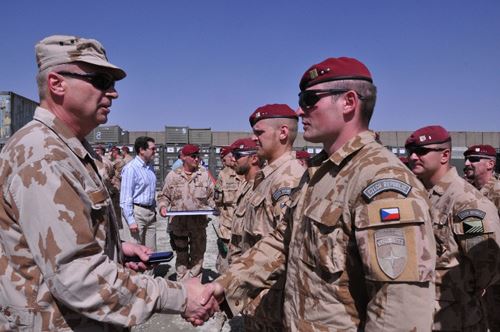The Czech army has been deployed on various missions in Afghanistan since 2002. The last 12 soldiers returned home at the end of June. It was the most extended operational deployment of the armed forces in the history of the Czech Army.
The North Atlantic Treaty Organisation forces were initially scheduled to withdraw from Afghanistan on 11 September this year. However, the rapid advance of Taliban fighters hastened everything.
Czech troops left the country at the end of June. The last dozen of them were brought to Pardubice airport by a large-capacity An-124 Ruslan aircraft. The unit’s task, operating in Afghanistan since February this year, was to close the Czech base in the capital and move the equipment to the Czech Republic.
11,500 troops
The longest-ever deployment of the Czech army has seen 11,500 soldiers in less than 20 years. Some of them have gone to Afghanistan repeatedly. Since 2002, uniformed men and women from the field hospital, chemical and biological protection, guard units, and the Logar surgical and reconstruction team have served there.
Twenty-one Afghan missions
The Czech deployment to Afghanistan was not the only ongoing mission. According to the Military History Institute, our presence in the country can be broken down into a total of 21 phases, each of which varies slightly in mission, several forces deployed, or duration. The 6th Field Hospital was the first to be deployed to Afghanistan. Its mission was to provide medical support to the International Security Assistance Force (ISAF) and humanitarian assistance to the Afghan population.
The 11th Field Hospital subsequently replaced it, and medical teams operated in 2002 and 2003. In total, over 290 servicemen and women served there.
In 2017, the first military police unit headed to Afghanistan to guard the Czech Embassy in Kabul. The Kamba military police unit was supposed to operate after 9/11, but the evacuation of the Czech embassy de facto ended its operations.
Fourteen boys did not return alive
The deployment of soldiers into live-action always carries a mortal risk. Unfortunately, this is what happened in the 14 Czech cases. Our first soldier to lose their lives was Master Sergeant Nikolai Martynov, who died on 4 May 2007. A member of the 4th Rapid Deployment Brigade in Chrudim died under an avalanche of mud and stones while on patrol in the mountains while rescuing a sunken vehicle in the rain. Two other soldiers were seriously injured.
From the Czech perspective, the most tragic day was 8 July 2014, when four of our soldiers died after a suicide bomber attack. The last fallen soldier was Staff Sergeant Tomáš Procházka on 22 October 2018. He was the victim of a shooting by a member of the Afghan security forces who attacked a Czech military vehicle.
20 billion crowns
This is the bill for our participation in all Afghan missions in the form of direct costs of the Czech state, or rather the Ministry of Defence. “Of this amount, operating expenses amounted to 6.14 billion, personnel costs to 8.2 billion and arms acquisitions in the form of capital expenditures amounted to 5.56 billion crowns for 2002 to 2020,” Petr Sýkora from the press department of the Czech Ministry of Defence confirmed.
Experience and prestige
“From our point of view, the Czech army gained invaluable combat experience in the conditions of a demanding multinational operation, which no peacekeeping training can fully replace, and which has resulted in all areas of the army’s activities. From command and control, through combat deployment, to the logistical support of units, ” Sýkora added.
Czechs in the interest of great powers?
Štěpán Křeček, chief economist at BH Securities, sees other pluses. “In my opinion, it was about showing our allies that we are a valid member of the team. This has cost us financial and human resources, but it also increased our reputation. It clearly defines our attachment to the West, which brings us many benefits, including economic ones, ” he said.
Nor should we be surprised, he said, that the great powers promote their interests at the expense of smaller countries. “This has happened at all stages of human history, and I do not doubt that it will continue to happen in the future. The important thing is that everything should have some measure. Ideally, it should only cost us so much that we don’t care too much. This is basically what we can say about the financial costs of the Czech mission in Afghanistan, ” concluded the chief economist of BH Securities.









Leave a Reply